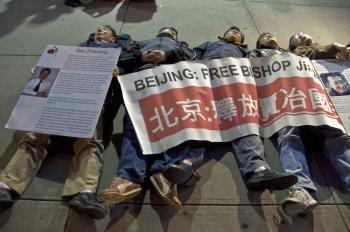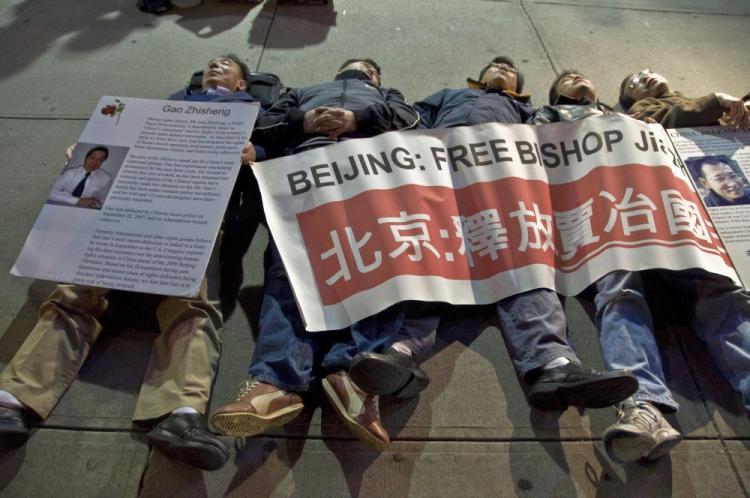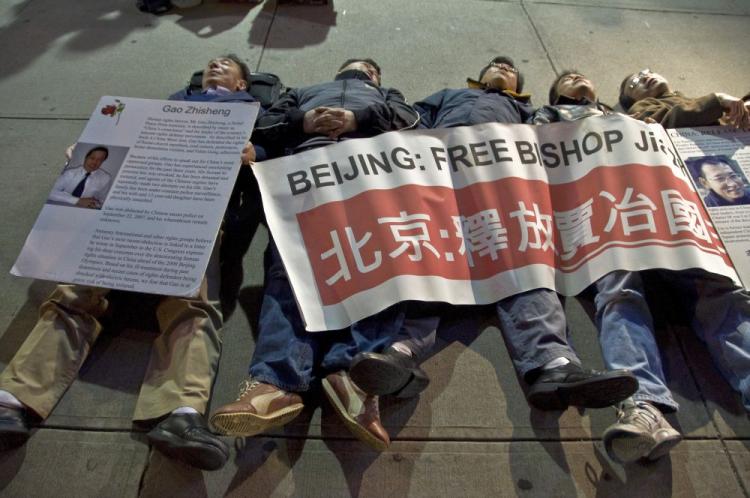NEW YORK—Zhang Jing, who spends her spare time trying to help women in China, never thought that in the U.S. she'd see the colors of communist China on the Empire State Building.
“I felt sick,” she said, standing in the cold wind outside the Chinese Embassy on Wednesday night.
She had come out to protest the Chinese Communist Party’s (CCP) 60 years of rule in China. What made her sick was the Empire State Building lighting up in red and yellow to honor the occasion.
Many in the Chinese community see the move as an affront, tantamount to America betraying them. “I never expected this to happen in America. I came to the U.S. to escape tyranny, and now when I come here I see it again. If I knew it would be like this, I wouldn’t have chosen to come to the U.S. I'd have gone to Europe back then.”
For people like Zhang Jing, communist China conjures images of violence, hatred, corruption, political repression, and fear. These are the modus operandi of the CCP, according to any dissident.
It was the first time Women’s Rights in China, her organization, had come out to protest. Just recently the CCP had blocked access to their Web site in the mainland, for no apparent reason, she said. “They’re just stingy, just petty and stingy. Even something as simple as women’s rights, they have to block it.” So Zhang Jing came out to make her voice heard.
On either side of Zhang were veteran democracy activists and Falun Gong practitioners, holding their own banners.
Shenqi Fu was in the former group, and had come out with his colleagues from the Democratic Forum of China to mark the 60th year of communist tyranny, as he saw it.
Fu has been in the anti-CCP protest game for decades, starting sometime in the late 70s. Living in Shanghai at the time and attending university, he began to find out about the Cultural Revolution, and the chaos and terror it had wrought on the Chinese people.
The start of the 80s was a relatively relaxed period of time for activists, as internal Party power-struggles gave them a greater degree of autonomy to connect with one another. It was during this time that people like Wei Jingsheng were in their prime. A backlash saw hundreds locked up, Fu included, and he has spent 10 years in Chinese prisons, on and off—the last time was for organizing a group hunger strike on the streets of Shanghai against communist rule.
His experience and advocacy means he’s got a handful of useful comparisons to explain China’s current situation. “It’s like the Soviet Union when it fell,” he says. Modern China is a house of sand, ready to collapse any time. “Just think, here we are in the U.S., here on the street, it’s perfectly normal. Now, in China, they’re celebrating National Day, but they’ve locked everyone inside their homes. Is that a strong country?”
In China’s iconic Tiananmen Square, for example, martial law conditions have been imposed since Sept. 30. Police shut down all shops, hotels and other businesses in the districts closest to the square, and enforced the lockdown with the heavy presence of bayonets, armored vehicles, and SWAT teams. It will be in effect until 10 a.m. Oct. 2, according to state media.
The reliance on armed forces to quell dissent, for Fu, is a clear illustration that the regime has reached the end of its rope. “When you use violence like that it means your credibility is gone.” He rattled off a list of other reasons the CCP’s time is up, including how much more defiant the Chinese people now are to the Party’s rule.
On the 60th anniversary of communist rule in China, dissidents appear to be simply waiting for it to end. And for Fu and his colleagues, it’s only a matter of time.
“Maybe it’s two years, maybe it’s three years, maybe ten years,” he says with an air of confidence. “Or, maybe it’s tomorrow.”
“I felt sick,” she said, standing in the cold wind outside the Chinese Embassy on Wednesday night.
She had come out to protest the Chinese Communist Party’s (CCP) 60 years of rule in China. What made her sick was the Empire State Building lighting up in red and yellow to honor the occasion.
Many in the Chinese community see the move as an affront, tantamount to America betraying them. “I never expected this to happen in America. I came to the U.S. to escape tyranny, and now when I come here I see it again. If I knew it would be like this, I wouldn’t have chosen to come to the U.S. I'd have gone to Europe back then.”
For people like Zhang Jing, communist China conjures images of violence, hatred, corruption, political repression, and fear. These are the modus operandi of the CCP, according to any dissident.
It was the first time Women’s Rights in China, her organization, had come out to protest. Just recently the CCP had blocked access to their Web site in the mainland, for no apparent reason, she said. “They’re just stingy, just petty and stingy. Even something as simple as women’s rights, they have to block it.” So Zhang Jing came out to make her voice heard.
On either side of Zhang were veteran democracy activists and Falun Gong practitioners, holding their own banners.
Shenqi Fu was in the former group, and had come out with his colleagues from the Democratic Forum of China to mark the 60th year of communist tyranny, as he saw it.
Fu has been in the anti-CCP protest game for decades, starting sometime in the late 70s. Living in Shanghai at the time and attending university, he began to find out about the Cultural Revolution, and the chaos and terror it had wrought on the Chinese people.
The start of the 80s was a relatively relaxed period of time for activists, as internal Party power-struggles gave them a greater degree of autonomy to connect with one another. It was during this time that people like Wei Jingsheng were in their prime. A backlash saw hundreds locked up, Fu included, and he has spent 10 years in Chinese prisons, on and off—the last time was for organizing a group hunger strike on the streets of Shanghai against communist rule.
His experience and advocacy means he’s got a handful of useful comparisons to explain China’s current situation. “It’s like the Soviet Union when it fell,” he says. Modern China is a house of sand, ready to collapse any time. “Just think, here we are in the U.S., here on the street, it’s perfectly normal. Now, in China, they’re celebrating National Day, but they’ve locked everyone inside their homes. Is that a strong country?”
In China’s iconic Tiananmen Square, for example, martial law conditions have been imposed since Sept. 30. Police shut down all shops, hotels and other businesses in the districts closest to the square, and enforced the lockdown with the heavy presence of bayonets, armored vehicles, and SWAT teams. It will be in effect until 10 a.m. Oct. 2, according to state media.
The reliance on armed forces to quell dissent, for Fu, is a clear illustration that the regime has reached the end of its rope. “When you use violence like that it means your credibility is gone.” He rattled off a list of other reasons the CCP’s time is up, including how much more defiant the Chinese people now are to the Party’s rule.
On the 60th anniversary of communist rule in China, dissidents appear to be simply waiting for it to end. And for Fu and his colleagues, it’s only a matter of time.
“Maybe it’s two years, maybe it’s three years, maybe ten years,” he says with an air of confidence. “Or, maybe it’s tomorrow.”







